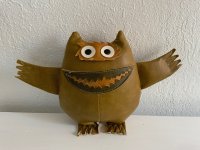MossRoad
Super Moderator
- Joined
- Aug 31, 2001
- Messages
- 60,225
- Location
- South Bend, Indiana (near)
- Tractor
- Power Trac PT425 2001 Model Year
When I was a kid, our neighbor worked for Uniroyal. He developed some process for printing dyes on naugahyde. It seemed every house in the neighborhood had Nauga Monsters like these.

That neighbor made a kite out of wood and naugahyde. It was well over 8' tall. One really windy day he took it out in a local park and up it went! Amazing. Then down it came. It was so heavy that when it crashed it blew to pieces.

That neighbor made a kite out of wood and naugahyde. It was well over 8' tall. One really windy day he took it out in a local park and up it went! Amazing. Then down it came. It was so heavy that when it crashed it blew to pieces.